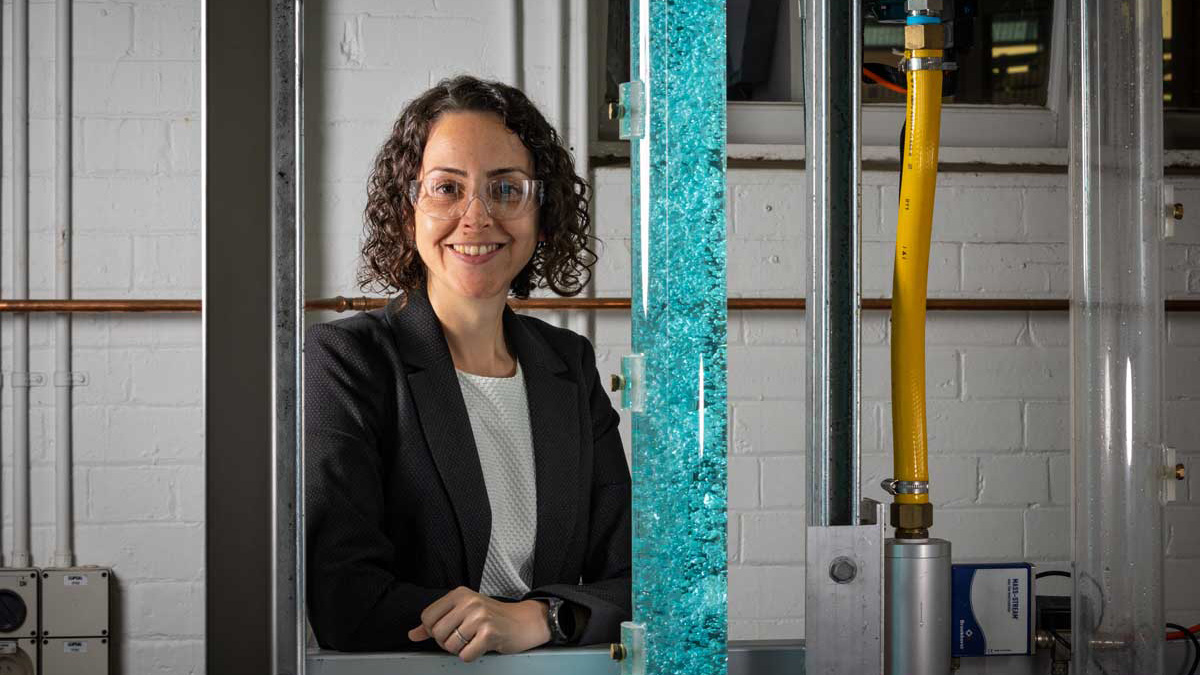Researcher Highlights
Making change for a more sustainable tomorrow
Associate Professor Mahshid Firouzi
As a passionate advocate for sustainable energy production, Associate Professor Mahshid Firouzi is helping educate industries and students to move towards a cleaner, more affordable future. Her work has been widely recognised as the catalyst for change.
 “I'm a very impact driven person so that's why I initially chose to study engineering and work in the areas I’m now in,” says Mahshid, who joined the University of Newcastle in 2021.
“I'm a very impact driven person so that's why I initially chose to study engineering and work in the areas I’m now in,” says Mahshid, who joined the University of Newcastle in 2021.
“These are the areas that I believe are key to the future economy, particularly as we transition to de-carbonisation.
“Australia and the world are facing huge challenges as we move away from a carbon-based economy to achieve zero-emissions. My work is at the cutting edge of enabling the energy and resources sectors to deliver this goal.”
A joint effort
Mahshid has collaborated and worked closely with industry experts and scientific disciplines and has developed research projects with other universities. These projects focus on ways to refine and improve sustainable solutions for cleaner energy, carbon capture and sequestration and hydrogen storage.
In a recent successful collaboration with academics and industry partners from various institutions, led by University of Adelaide, Mahshid secured $1.9m funding to set up a comprehensive facility to enable large scale underground hydrogen storage.
Mahshid is also a Chief Investigator at the ARC Centre of Excellence for Enabling Eco-Efficient Beneficiation of Minerals (COEMinerals), based at the University.
“The Centre of Excellence works with researchers on projects that aim to make mineral processing more environmentally sustainable,” says Mahshid. “We aim to secure the future availability of the critical metals we need for modern living.”
The Centre is led by Laureate Professor Kevin Galvin who oversees collaboration with researchers from seven Australian universities, CSIRO, industry partner organisations, as well as leading international researchers.
Keeping up with the flow
By developing close relationships with different counterparts from a range of industries, Mahshid has successfully secured more than $44m through competitive funding schemes such as Australian Research Council (ARC) Linkage, Discovery, Industry Fellowship, National Energy Resources Australia.
Through COEMinerals, Mahshid is currently working on eco-beneficiation of minerals including rare earths which are key to transitioning to clean energy. She is working with COEMineral’s CIs from multiple institutions and disciplines on optimising system hydrodynamics and incorporating bio-inspired reagents derived from green sources to replace petroleum-based and hazardous reagents in mineral processing.
Mahshid’s current research on unconventional gas as a transitional source of energy has led to the development of a novel artificial lift system (patented in Australia, USA, Russia and China). This system will enable low cost and low emission dewatering of wells, which is key to the sustainable transitioning to low carbon economy.
“My current project aims to reduce methane emission to the atmosphere by reducing the downtime caused by downhole pumps, the current dewatering technology.
“Currently operators have to open wells to pull out a pump to replace it, which is associated with significant methane emissions that arise during well maintenance. The new technology will prevent this. It will also optimise gas production reducing the need for more wells,” says Mahshid.
Mahshid is working with her industry partners, through a CRC-P funding granted by the Department of Industry, Science and Resources, on the field trial and commercialisation of this technology.
“This may lead to widespread adoption of technology informed by my work and benefiting our world,” she says.
Recognition as a leader
Mahshid’s achievements have been recognised through multiple awards, including the 2022 University’s Engineering School Excellence in Learning, 2018 UQ Engineering Faculty Early Career Researcher Award and being one of two Australian female scientists profiled by the Association of Academies and Societies of Sciences in Asia.
Similarly, her research outcomes published in top peer-reviewed journals have contributed to the advancement of global knowledge in her field of research. Her research projects have helped inspire and motivate engineering students.
“Delivering robust education opportunities and outcome-focused research opportunities helps fuel more research and improvements,” says Mahshid. “It ensures the future leaders of industry are skilled and empowering to champion science-based, data-driven, positive change.”
A bright future
Moving forward, Mahshid plans to continue translating her research into outcomes that beneficial to how we live, while minimising the impact to the environment.
“Transitioning into low carbon economy needs to be done in a very efficient way to minimise the footprint of the process,” she says.
“I’m proud of what I've done so far. I can see that my work is in fact making the change in reducing carbon emission. The future of sustainable energy is looking promising, but there’s so much more to do.”
The University of Newcastle acknowledges the traditional custodians of the lands within our footprint areas: Awabakal, Darkinjung, Biripai, Worimi, Wonnarua, and Eora Nations. We also pay respect to the wisdom of our Elders past and present.
